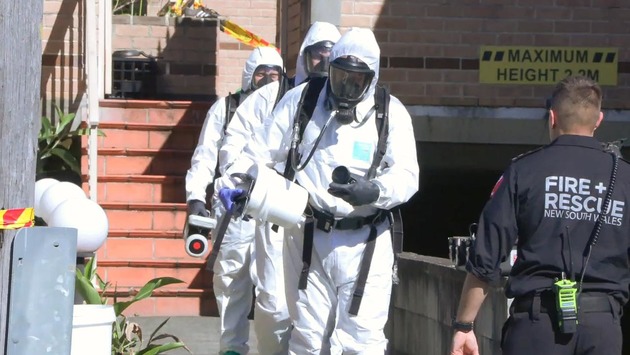Ringo
Gold Member
To arrest 24-year-old Australian Emmanuel Lidden, the police brought in border guards, firefighters and doctors. But all he wanted to do out of curiosity was to build a collection of all the elements in the periodic table.
A peaceful resident of Sydney, 24-year-old train driver Emmanuel Lidden is a passionate collector. He used to collect stamps and banknotes, but in recent years he has been seized by a new idea: to collect samples of all the elements mentioned in Mendeleev's periodic table.
As long as Lidden acquired and placed in tubes pieces of magnesium and potassium, no one was interested. But after lead in the table begins radioactive materials. And the moment came when, in a burst of collector's excitement, Lidden ordered himself plutonium. He found the right product on an American scientific website, paid for it and ordered delivery to his parents' house.
The red-hot shipment was tracked down by police the minute it arrived in the country. But instead of confiscating it and calling Lydden to explain himself, the police went ahead with a high-profile operation. It authorized the plutonium to be shipped to an address, and then a police SWAT team, reinforced by border guards and firefighters, supervised by a medical team called in, stormed the house to arrest the recipient and seize the dangerous cargo.
And now Lidden is facing trial. He faces a felony charge of violating the Nuclear Non-Proliferation Act. The penalty is up to 10 years in prison. By the way, no one in Australia has ever been charged with such a crime before.
The attorney insists his client is not guilty, but merely naive, that he is not a deranged maniac with nefarious plans, but a bemused “nerd.” “He did not import or possess these items with any sinister intent ... these were crimes committed out of pure naivety,” defense lawyer John Sutton told Sydney District Court. - 'It was a manifestation of complacency, a withdrawal into collecting, it could have been anything, but in this case he was grasping at collecting the periodic table.”
The prosecution, however, strongly disagrees. In the prosecutor's view, the search for illegal materials such as plutonium threatened Australia - nothing less! - the creation of a new criminal market.
Interestingly, despite the menace of the charge and the noisy detention, Lydden was released to lead a normal life before his trial. He was kicked out of train driving and made a living flipping burgers at a fast food restaurant.
This fact alone - that he was not put into isolation beforehand - shows that law enforcement agencies realize that the man in front of them is not a terrorist. Nevertheless, the prosecution is very serious (they pay his salary for this).
The verdict will be handed down on April 11. Whatever it may be, it is already clear: Lidden's interest in science has been snuffed out for the rest of his life. On the other hand, it was the intervention of the police that made it possible for Lidden to have this “rest of his life” at all. After all, if the crazy collector had not been caught for acquiring plutonium, sooner or later he would have decided that his collection was severely lacking in cesium, strontium and polonium....

A peaceful resident of Sydney, 24-year-old train driver Emmanuel Lidden is a passionate collector. He used to collect stamps and banknotes, but in recent years he has been seized by a new idea: to collect samples of all the elements mentioned in Mendeleev's periodic table.
As long as Lidden acquired and placed in tubes pieces of magnesium and potassium, no one was interested. But after lead in the table begins radioactive materials. And the moment came when, in a burst of collector's excitement, Lidden ordered himself plutonium. He found the right product on an American scientific website, paid for it and ordered delivery to his parents' house.
The red-hot shipment was tracked down by police the minute it arrived in the country. But instead of confiscating it and calling Lydden to explain himself, the police went ahead with a high-profile operation. It authorized the plutonium to be shipped to an address, and then a police SWAT team, reinforced by border guards and firefighters, supervised by a medical team called in, stormed the house to arrest the recipient and seize the dangerous cargo.
And now Lidden is facing trial. He faces a felony charge of violating the Nuclear Non-Proliferation Act. The penalty is up to 10 years in prison. By the way, no one in Australia has ever been charged with such a crime before.
The attorney insists his client is not guilty, but merely naive, that he is not a deranged maniac with nefarious plans, but a bemused “nerd.” “He did not import or possess these items with any sinister intent ... these were crimes committed out of pure naivety,” defense lawyer John Sutton told Sydney District Court. - 'It was a manifestation of complacency, a withdrawal into collecting, it could have been anything, but in this case he was grasping at collecting the periodic table.”
The prosecution, however, strongly disagrees. In the prosecutor's view, the search for illegal materials such as plutonium threatened Australia - nothing less! - the creation of a new criminal market.
Interestingly, despite the menace of the charge and the noisy detention, Lydden was released to lead a normal life before his trial. He was kicked out of train driving and made a living flipping burgers at a fast food restaurant.
This fact alone - that he was not put into isolation beforehand - shows that law enforcement agencies realize that the man in front of them is not a terrorist. Nevertheless, the prosecution is very serious (they pay his salary for this).
The verdict will be handed down on April 11. Whatever it may be, it is already clear: Lidden's interest in science has been snuffed out for the rest of his life. On the other hand, it was the intervention of the police that made it possible for Lidden to have this “rest of his life” at all. After all, if the crazy collector had not been caught for acquiring plutonium, sooner or later he would have decided that his collection was severely lacking in cesium, strontium and polonium....

